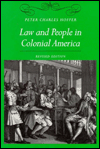Law and People in Colonial America
This revised edition of Law and People in Colonial America will incorporate recent scholarship and encompass American Indians, the French, and Spaniards as people who—on the fringes of English settlement—raised interesting questions. Among them: how in legal terms did the English deal with "marginal"societies; how does this posture help us to understand English law and the changes the New World forced upon it; and how did these people on the outside themselves view English law?
Search in google:
This revised edition of Law and People in Colonial America will incorporate recent scholarship and encompass American Indians, the French, and Spaniards as people who — on the fringes of English settlement — raised interesting questions. Among them: how in legal terms did the English deal with "marginal"societies; how does this posture help us to understand English law and the changes the New World forced upon it; and how did these people on the outside themselves view English law? Library Journal Hoffer attempts to add to our understanding of American legal history by examining how the American colonists transformed an existing body of British law into a truly unique American product. His themes are twofold: the reformist impulse coming to fruition in the revolutionary period of 1763-76; and the blurring of distinctions between public authority and justice that have remained controversial even to this date. So little readable American legal history is available. One exception is Lawrence Friedman's History of American Law (S. & S., 1986. 2d rev. ed.). Now we have Hoffer's small work. Although focusing on colonial America, the book is highly recommended to the reader seeking an understanding of the development of American law. See Morton Horwitz, below, for a broader perspective.-- Jerry E. Stephens, U.S. Court of Appeals Lib., Oklahoma City
Preface to the Revised EditionPreface to the First EditionAcknowledgmentsCh. 1"That the Said Statutes, Lawes, and Ordinances May Be as Neere as Conveniently May, Agreeable to the Forme of the Lawes and Pollicy of England"1Ch. 2"And to the End that All Laws Prepared by the Governour and Provincial Council Aforesaid, May Yet Have the More Full Concurrence of the Free-Men of the Province"27Ch. 3"If I Am Become Their Son, They Must Act the Part of a Father"50Ch. 4"These Dirty and Ridiculous Litigations Have Been Multiplied in This Town, Till the Very Earth Groans and the Stones Cry Out"76Ch. 5"Just so th' Unletter'd Blockheads of the Robe; (Than Whom no Greater Monsters on the Globe); Their Wire-Drawn, Incoherent, Jargon Spin, Or Lug a Point by Head and Shoulders In"92Ch. 6"On What Principles, Then, on What Motives of Action, Can We Depend for the Security of our Liberties, of our Properties...of Life Itself?"127Conclusion154Notes157A Bibliographic Essay165Index187
\ Journal of American HistoryOutlines the main features of English law and legal institutions, describes their transmission to New England and Virginia, and argues for the emergence of 'an American way of law, a style of keeping order and resovling disputes' that was more open and less formalistic than that of England... Legal and Social Historians will applaud the appearance of this synthesis, and, in a decade's time, will demand a revised edition.\ \ \ \ \ Journal of Legal HistoryA synthetic essay of considerable grace and scope... An excellent overview of the field.\ \ \ Library JournalHoffer attempts to add to our understanding of American legal history by examining how the American colonists transformed an existing body of British law into a truly unique American product. His themes are twofold: the reformist impulse coming to fruition in the revolutionary period of 1763-76; and the blurring of distinctions between public authority and justice that have remained controversial even to this date. So little readable American legal history is available. One exception is Lawrence Friedman's History of American Law (S. & S., 1986. 2d rev. ed.). Now we have Hoffer's small work. Although focusing on colonial America, the book is highly recommended to the reader seeking an understanding of the development of American law. See Morton Horwitz, below, for a broader perspective.-- Jerry E. Stephens, U.S. Court of Appeals Lib., Oklahoma City\ \ \ \ \ BooknewsHoffer history, U. of Georgia tells the story of early American law from its beginnings in the British mainland colonies to its maturation in the crisis of the American Revolution. Annotation c. Book News, Inc., Portland, OR booknews.com\ \ \ \ \ Lawrence M. FriedmanThere is quite a large literature on the history of law in the colonial period, but there are surprisingly few attempts to sum it all up within the covers of a single book. Prof. Hoffer's book is just such an attempt. It is very concise, probably a bit too concise -- the text is really only about 120 pages long -- but quite successful, I think, at what it is trying to do. The decision to speed over so much ground in so few pages is dangerous, but it does concentrate the mind wonderfully. Hoffer sums up, for example, the Puritan attitudes and practices on criminal justice with great economy. The only way to succeed in a book like this is to be willing to make bold generalizations; and so what Hoffer lacks in detail, he makes up for in broad strokes of theory and insight. Terseness also forces you to adapt an approach, a point of view, and stick to it; and Hoffer's approach, basically, is the "externalist, law-and-society position," a decision I heartily approve of. In other words, his approach to colonial law is not technical, not legalistic. It is not geared to the development of legal concepts and institutions from the inside; but an exploration of how concrete social conditions and ideologies molded the distinctive character of colonial law. Of course, he is not the first historian to take this approach -- all of the best ones do, if I may be permitted to say so -- but he does it well, and thoroughly. In the preface, Hoffer singles out two major themes of the book as particularly important. The first is the "reformist impulse" of American law. The colonists were opposed, from the outset, to the "severity and bias" of English criminal law, and to the "feudal relics of its civil law." They insisted instead on "a more humane and forgiving criminal law and a more egalitarian civil law." These reform impulses were one ultimate source of the "revolutionary crisis of 1763-76." This is an important point. As we look backwards, we tend to see colonial law as a pretty primitive, theocratic, and narrow- minded affair; and of course it was. But many of the early settlers, and their leaders, were dissenters of one sort or another; and this is a crucial point in understanding what they were about, and why. The conditions of life in the colonies, too, made the colonists "reformists," almost despite themselves. "Reform" of course is a word of praise; perhaps Hoffer should have hedged a bit and said "innovation" instead. Not all innovations were "humane." Slavery -- to remind ourselves of something unpleasant -- was unknown to English law; it was a new world invention. A second theme is that "the energy pulsating through the first American legal systems blurred distinctions between public and private law," that is, between constitutional and community-wide rules, and the private disputes "over rights, duties, and property among individuals." To put it another way, perhaps a bit too crudely, the colonists did not buy the theory that legislatures make laws, while courts settle disputes, and never the twain shall meet. Hoffer also stresses a theme which perhaps includes these and overrides them. This is the increasing use of law, the increasing "legalism" of the colonists, the increasing resort to litigation and to other forms of legal behavior. In particular, there was a "surge" of litigation in the 1720's and 1730's. Hoffer sees the source of this "surge" in a sense of "wronged dignity" and "damaged personal self-worth." People stop disputing and negotiating when they think that their opponent has "broken the rules," that is, the rules of the game, the norms of the community. Such a person "must be chastised publicly. The Page 175 follows: lawsuit is thus an exchange of visible signs -- words, gestures, pieces of paper -- a public conversation among the parties carried out in front of the community; trials are "dramatic dialogues," in which the neighbors "act as chorus and audience" p. 54. I am intrigued by this idea, but not entirely convinced. In one sense, it is similar to a theme we find in Bruce H. Mann's 1987 book, NEIGHBORS AND STRANGERS: LAW AND COMMUNITY IN EARLY CONNECTICUT. The idea is that "community" declined in the 18th century; in the 17th century, everybody in the tight little towns knew everybody else, and personal relations dominated impersonal, "legal" relationships. It was, in other words, a walk from Gemeinschaft to Gesellschaft. Hoffer's thesis, however, has quite a different flavor. The description of trials as "dramatic dialogues," the reference to "wronged dignity" and the like, suggest a kind of intermediate stage in the passage from face-to-face communities to the full- blown impersonal, market-oriented world of the 19th century. As I say, I am not entirely persuaded; but the theme is well worth exploring. Hoffer also tries to connect the "litigation explosion" with the political upheavals that ended up in the war for independence. Americans, he says, "began to believe that complex social problems had, or ought to have, legal solutions" p. 96. Law became politicized; and politics legalized. Politics and law merged "at the highest levels of theory and practice" p. 97. The central revolutionary idea was that government ought to be accountable to the people, accountable, however, in terms of law, rights, and fundamental principle. It was not entirely clear to me how Hoffer connected all of this to his general reformist theme; nor whether he had tried hard enough to specify exactly what aspects of American society brought about these massive changes. Far more important, I think, is the fact that in my judgment he has got the story right, and has told it in an interesting and coherent way, and in a theoretically challenging way. He has packed a lot of substance into a small space, and generated a lot of ideas to chew on. There were some spots here and there where extreme compression results in a certain distortion of the historical record. But these are quibbles. This is a valuable book, and a thoughtful one.\ \








